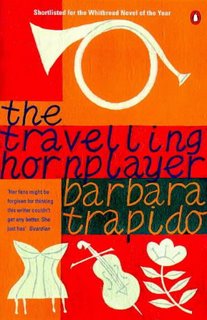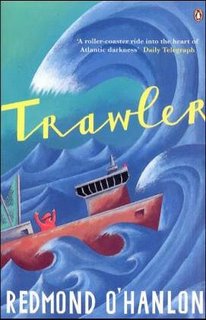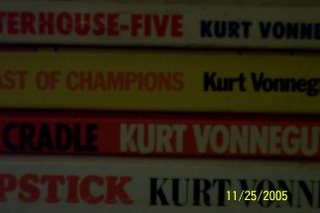
I'm in Chicago for xmas and I managed to sneak in some book shopping while finishing my xmas shopping today. I went to one of those temporary book closeout stores that pop up in strip malls in the suburbs. These places specialize in remainders and overstock. I was about to leave, empty handed, when I spotted the new arrivals table.
I bought a copy of Barbara Trapido's Frankie and Stankie for two bucks. Brand new, a UK edition. I don't know if it was published in the US (it came out in 2003) but I've been looking for a copy since then. She's a South African who left for England a long time ago. I think this is her first book about South Africa. (I love South Africans who leave for England and become writers. J.M Coetzee is probably the most famous one now, but until last year - when he won the Nobel - that wasn't the case. And Justin Cartwright, too. And Trapido.) Her novel The Travelling Hornplayer (first chapter)is a fantastic book - its a sprawling story about a few English academic families and what links them - but its only 250 or so pages. I don't know why but I love coincidences so much. This book is full of them and every is connected in the end. A very moving book, too. And she's a great writer. A super-impressive feat in my mind. I was thrilled beyond belief to find her book today.
And I also bought a newly republished Michael Frayn novel, Towards the End of the Morning. Its an English copy and it will look very nice on my Michael Frayn shelf. (In a remarkable act of self-restraint, I passed on an inexpensive copy of the biography of Samuel Pepys that Frayn's wife wrote. I wanted to read it based on all the laudatory reviews it got - but I realized that I am never going to read 500 pages on the life a 17 century diarist no matter how much I might want to.) Also, I bought a new copy of something called The Blackpool Highflyer by Andrew Martin - a mystery novel revolving around trains in early 20th century England. I've read reviews of a few of his books and have been looking for them for a while - but again, he doesn't seem to be published in the country.
Lastly I picked up a copy of Juno and Juliet by Julian Gough. Its set in Galway, Ireland. I have it in hardcover, unread, at home. But since I am going there in a few weeks I thought it would be fun to read before hand.
I started reading one of my two unread Ken Bruen mysteries, The Magdalene Martyrs. A few summers ago I read a review in The Guardian about his first book to be set in Galway. The Guardian review said good things about it so I ordered it from Amazon UK. And I got hooked. There were, I thought at the time, seemingly a million things wrong with the book. I kept thinking, you can't do that. But I got hooked. And really fell for him. I've read all of his other stuff since.


